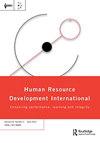Different cultures, different gateways: culture shapes stratified job descriptions on LinkedIn
IF 3.9
Q2 MANAGEMENT
引用次数: 0
Abstract
ABSTRACTRecruiting process serves as an important gateway context to fuel social disparity. Previous studies on social inequality focused on how independent competence valued in high-status contexts, aligns with dominant American cultural norms, while interdependent competence valued in low-status contexts, clashes with these norms. Scholarstheorised that individuals with higher status have more resources to afford independence than those with lower status. However, the reliance on Western samples may overlook the influence of cultural norms, leading to ineffective inclusive human resource development strategies. To explore how societal culture shapes competence models at different levels of status, we utilised big data analysis methods to examine job descriptions across occupational statuses and cultures. We analysed 150,708 online job descriptions posted in China and the U.S.A. on LinkedIn. Our research findings indicate that in the U.S.A, higher-status jobs place greater more emphasize independent competence, whereas in China, higher-status jobs require candidates to possess more interdependent competence. This suggests that culture, rather than material resources, shapes social stratification in the labour market. We discuss these findings’ implications, including the vital role of job descriptions in facilitating or hindering access to desired opportunities and upward social mobility across cultures and how HRD professionals can intervene in different cultural contexts.KEYWORDS: Cultureoccupational statusjob descriptiontext miningcompetence model Disclosure statementNo potential conflict of interest was reported by the author(s).Notes1. By the term working-class contexts, we refer to contexts in which most people have relatively low incomes or relatively low-status occupations. In contrast, by middle-class contexts, we refer to contexts in which most people have relatively high incomes, or relatively high-status occupations (Stephens, Townsend, and Dittmann Citation2019).2. By the term gateway institutions, we refer to the established organisations that can function as key access points to future work opportunities, valued life outcomes, and upward social mobility (Ridgeway and Fisk Citation2012).3. By the terms higher status groups and lower status groups, we mean people from groups deemed to have higher status and people from groups deemed to have lower status. To avoid wordiness, we will use higher status groups and lower status groups hereafter.不同的文化,不同的门户:文化塑造了LinkedIn上分层的职位描述
摘要招聘过程是社会差异的重要入口。先前关于社会不平等的研究关注的是,在高地位背景下,独立能力的价值如何与美国主流文化规范保持一致,而在低地位背景下,相互依赖能力的价值如何与这些规范相冲突。学者们的理论是,地位高的人比地位低的人有更多的资源来负担独立。然而,对西方样本的依赖可能忽略了文化规范的影响,导致包容性人力资源开发战略无效。为了探索社会文化如何塑造不同地位水平的能力模型,我们利用大数据分析方法来研究不同职业地位和文化的职位描述。我们分析了在中国和美国领英上发布的150,708个在线职位描述。我们的研究结果表明,在美国,职位较高的职位更强调独立能力,而在中国,职位较高的职位要求应聘者拥有更多的相互依赖能力。这表明,文化,而不是物质资源,塑造了劳动力市场的社会分层。我们讨论了这些发现的含义,包括职位描述在促进或阻碍获得理想机会和跨文化向上社会流动方面的重要作用,以及人力资源开发专业人员如何在不同的文化背景下进行干预。关键词:文化、职业状况、职位描述、文本挖掘能力模型披露声明作者未报告潜在的利益冲突。我们所说的“工人阶级环境”指的是大多数人收入相对较低或职业地位相对较低的环境。相比之下,在中产阶级背景下,我们指的是大多数人收入相对较高或职业地位相对较高的背景(Stephens, Townsend, and Dittmann citation, 2019)。通过术语“门户机构”,我们指的是可以作为未来工作机会、有价值的生活成果和向上社会流动的关键入口的已建立的组织(Ridgeway和Fisk citation, 2012)。所谓地位较高的群体和地位较低的群体,我们指的是地位较高的群体和地位较低的群体的人。为了避免啰嗦,我们将使用更高的地位群体和更低的地位群体。
本文章由计算机程序翻译,如有差异,请以英文原文为准。
求助全文
约1分钟内获得全文
求助全文
来源期刊

HUMAN RESOURCE DEVELOPMENT INTERNATIONAL
MANAGEMENT-
CiteScore
11.40
自引率
11.10%
发文量
43
期刊介绍:
Human Resource Development International promotes all aspects of practice and research that explore issues of individual, group and organisational learning and performance. In adopting this perspective Human Resource Development International is committed to questioning the divide between practice and theory; between the practitioner and the academic; and between traditional and experimental methodological approaches. Human Resource Development International is committed to a wide understanding of ''organisation'' - one that extends through self-managed teams, voluntary work, or family businesses to global enterprises and bureaucracies. Human Resource Development International also commits itself to exploring the development of organisations and the life-long learning of people and their collectivity (organisation), their strategy and their policy, from all parts of the world. In this way Human Resource Development International will become a leading forum for debate and exploration of the interdisciplinary field of human resource development.
 求助内容:
求助内容: 应助结果提醒方式:
应助结果提醒方式:


